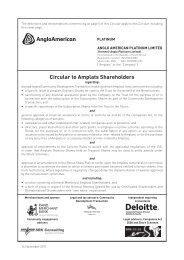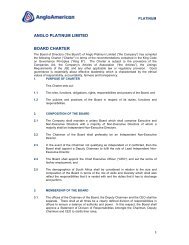Download PDF - Anglo American Platinum
Download PDF - Anglo American Platinum
Download PDF - Anglo American Platinum
You also want an ePaper? Increase the reach of your titles
YUMPU automatically turns print PDFs into web optimized ePapers that Google loves.
play an effective role in livelihoods development initiatives (and inthe overall resettlement process), would have enabled AP to eitherengage in suitable skills enhancement or to find alternative capacityto meet the requirements of the Motlhotlo resettlement – in thisinstance, those related to community development initiatives.Another constraining factor is the psycho-social conditions withinthe resettled communities. Comments made by Governmentstakeholders, and by community residents themselves, pointto a climate of dependency on AP for on-going provision ofemployment, services and general assistance. An attitude ofdependency (to whatever degree) can severely hamper thedevelopment of sustainable development initiatives, which require apartnering approach, underpinned by a vision for self-dependence.Whilst this attitude of dependency is certainly not the only realitywithin the resettled communities – one need only reflect on thelevel of mobilisation against the resettlement as evidence – therewere community comments made which pointed to a belief thatsolutions for improving their future do not lie in their own handsbut should come solely from AP. Whilst it is beyond the remit of thisreview to analyse the causal factors behind such attitudes, it is notedthat such expectations present an extremely difficult environmentfor the implementation of development initiatives.The inclusion of a social specialist on the Project Management Team,namely, someone with experience and knowledge of the planningand implementation of community development initiatives, wouldhave added significant value to this aspect of the post-resettlementplanning process. In spite of AP’s efforts to include the services of aSocial Specialist Consultant, this was declined by the S21s and theirlegal advisors.AP’s relative poor performance with post-resettlement developmenthas had implications across the resettlement process – in termsof unmet community expectations around employment andbenefits associated with the Mine, and the impact this hashad on community relations; in terms of on-going grievancesregarding conditions of their houses, fuelled in part by an inabilityof homeowners to pay for the upkeep of individual homesteads,and the apportioning of blame to AP; the likelihood of long termcommunity dependence on the Mine, and linked to this, thepotential for community reluctance to concede any ‘compliance’ orgood performance on AP’s part, lest this weaken their bargainingposition.Lack of a Systematic Monitoring and Evaluation ProcedureWhen measured against the IFC requirements for monitoring, it isclear that no systematic monitoring and evaluation process wasput in place for the resettlement process – this is in spite of thefact that the draft RAP made some progress towards developingthese measures. One could argue that the strong managementand supervision function carried out by the Project ManagementTeam served as something of an informal monitoring function. Thisoversight role was carried out, in particular, by the assistant projectmanagers and the ‘community liaison and social services’ team, whomanaged the grievance office and interacted on a regular basiswith the community residents, and the Operational and CommunityLiaison Officer (CLO) teams.During the audit and compensation process, AP ensured thatthe audit team were supported by 14 assistants (known as theOperational Team). These comprised seven people each from GaPuka and Ga Sekhaolelo. This team was recruited and trained bythe Project Management Team. CLOs, two from each community,were also appointed by the community and were employed tohandle the grievances being lodged during the audit and householdconstruction phase.The regular interaction of these teams with local residents, andoversight of the audit, construction and compensation process, willhave given them the opportunity to informally monitor the situationon the ground, and identify issues as they arose. Where complaintsor issues were raised, these would be recorded in the grievance logand signed off once corrective action had been taken.However, an integrated monitoring and evaluation plan andassociated programme of Key Performance Indicators (KPIs) andtargets were not developed and applied to all areas of resettlementactivity in the planning, implementation and post-resettlementstages. Performance was not routinely tracked against targetsto establish relevant operational controls/ checks and balances.Evidence of such an approach is seen in the HomeownerQueries and Defects procedure, but less in the areas of social riskmanagement, and community liaison. The monitoring measuresused are therefore not considered an adequate substitute for thesystematic and regular monitoring of performance, and associatedcorrective action, both of which are key when managing thecomplexities inherent to resettlement. This is considered a significantgap in the Motlhotlo resettlement process.Concerns regarding the lack of capacity of these teams (assistantproject managers, ‘community liaison and social services’ team andthe CLOs) were also raised as a concern, as discussed in Section B.3.3.Lack of Mechanism to Resolve Disputes in ImpartialMannerIn spite of key strengths within the grievance procedure (notably,those relating to the household audit, compensation andvii


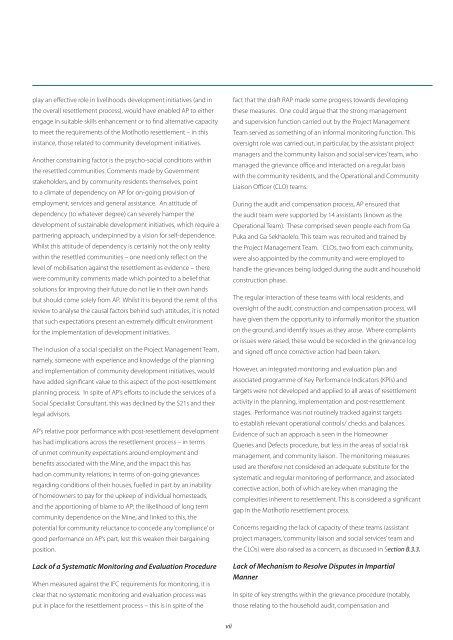
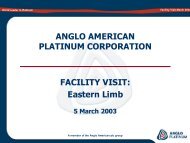

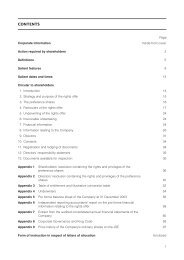

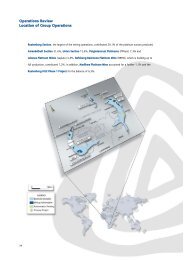



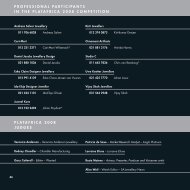
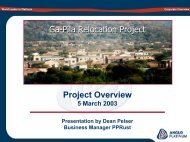

![[PDF] Mogalakwena Mine - Anglo Platinum](https://img.yumpu.com/43065142/1/184x260/pdf-mogalakwena-mine-anglo-platinum.jpg?quality=85)
